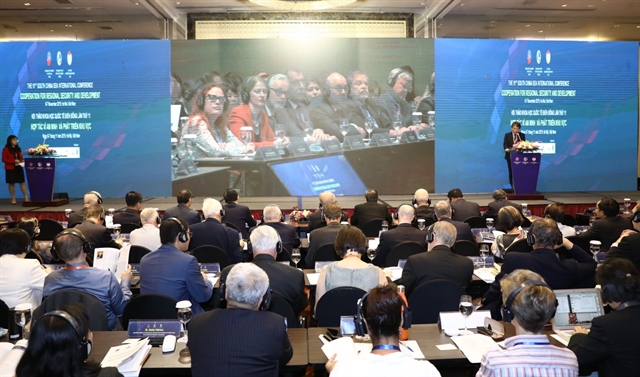 Politics & Law
Politics & Law


|
| Eleventh South China Sea International Conference on “Cooperation for Regional Peace and Development”, organised by the Diplomatic Academy of Vietnam in cooperation with the Việt Nam Lawyers Association and the Foundation for East Sea Studies, opened on Wednesday in Hà Nôi. — VNA/VNS Photo Văn Điệp |
HÀ NỘI — Experts and policymakers agreed that the rule of law and respect for international law are central principles in handling the South China Sea (known as East Sea in Việt Nam) issue at an international conference that began yesterday in Hà Nội.
The two-day event – drawing 50 speakers and some 250 officials, scholars and diplomats from Việt Nam and abroad – commenced shortly after a months-long standoff between Viet Nam and China in the waters over a survey ship, accompanied by coast guard vessels, encroaching the Vietnamese Exclusive Economic Zone (EEZ).
Dr. Nicola Casarini from the Istituto Affari Internazionali of Italy said at the second plenary session on “The South China Sea in Competing Visions” that Beijing continues to challenge the rules-based order in the area by building artificial islands with military facilities and weapons systems, drilling for oil and gas, and chasing off its Southeast Asian neighbours’ fishing vessels from waters where they have the rights to fish in accordance with the United Nations Convention on the Law of the Sea (UNCLOS).
Deputy Minister of Foreign Affairs Lê Hoài Trung said unilateral interpretation of international law in a way that goes against the international community’s common interest “undermined the rule of law” and “eroded trust in the international legal system” as he made a keynote speech at the 11th edition of the two-day South China Sea International Conference, themed 'Cooperation for regional security and development'.
These moves could become “dangerous precedents that threaten regional and global peace, stability and security,” Trung said.
The diplomat said security and maritime safety in the South China Sea are critical for global trade and prosperity.
Nguyễn Vũ Tùng, Director of the Diplomatic Academy of Việt Nam, noted the “complicated developments” in the resource-rich sea area in the past 10 years.
Tùng said dialogue and co-operation continue to be the “main stream” – as manifested by the fact that ASEAN countries and China finished the first reading of the Single Draft Negotiating of the Code of Conduct in the South China Sea in late July this year, in addition to marine drills between ASEAN and China as well the US – which helps foster trust and maintain security in the region.
“However, militarisation, conflicts and escalation of tensions continue to be a worry – with acts of threatening or using asymmetric powers on the rise while the effectiveness of the international law system is challenged by parties who wish to impose their own interpretation of the law in their favour,” Tùng said.
Tùng said the South China Sea should be seen as a “connective sea” between oceans, “the meeting place of interests between countries within and outside the region."
This is basically the viewpoint within the ASEAN outlook on the Indo-Pacific region that the bloc adopted earlier this year, he said, referring to a document that confirmed the ASEAN stance on the policy to link the Indian and Asia-Pacific oceans.
Peace and co-operation for development is the prevalent trend in general, with the United Nations Convention on the Law of the Sea 1982 (UNCLOS 1982) serving as the legal framework to settle disputes, while the South China Sea is situated within a region that draws attention from the entire world, Deputy Minister of Foreign Affairs Trung said.
He added that coastal countries have claimed to respect international co-operation and there is a wealth of experience in settling overlapping claims via peaceful measures.
However, Trung also wanted to note the ambiguity in the conformity of claimant countries and interpretation of UNCLOS 1982 in the settlement of disputes and differences, the wide-ranging nature of issues contained within challenges like maritime cooperation or overlapping claims, and how to make sure that competition will not outweigh co-operation.
Speaking to the media, John Rennie Short, professor at the University of Maryland, Baltimore County in the US, said the forum serves as important platform for the world to hear about the positions of Asian countries – especially Việt Nam and the Philippines – as the South China Sea issue is usually “framed in terms of China or China versus the US.”
Việt Nam needs to keep promoting its position and making a strong case to the wider world, particularly “the argument that things could be controlled by the rule of law rather than Chinese unilateral actions,” he said, especially as Việt Nam has virtually become the “frontline” against Chinese ambitions in the South China Sea.
However, the US-based professor expressed optimism that as time goes by, ASEAN countries will get more interconnected not only in economic matters but also in terms of strategic interests and become “a more coherent unit” similar to that of the European Union, making the regional grouping a “stronger counterweight.”
The 11th edition of the annual conference includes six plenary and six roundtable sessions, focusing on various themes.
As part of the conference, a special session will be held to celebrate the 25th anniversary of the entry into force of the 1982 UNCLOS, which became effective in November 1994. — VNS




